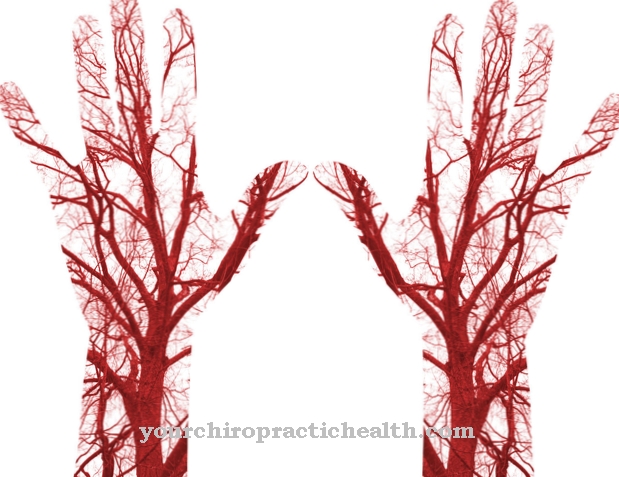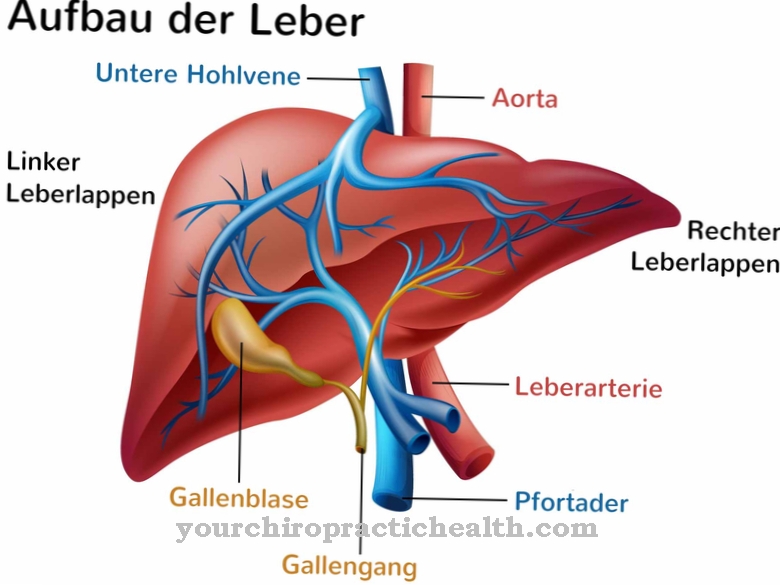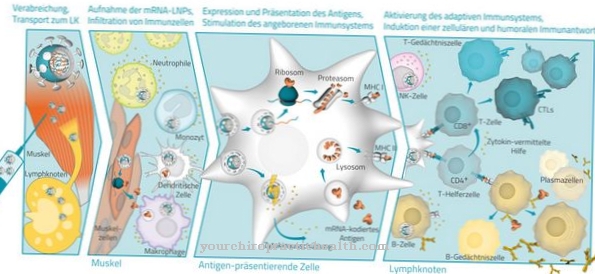The Lymphatic system is distributed throughout the body as part of the immune system. It is not a single organ, but a complex network of lymphatic organs and the lymphatic system.
What is the lymphatic system?
The name lymphatic system comes from Latin. The word Lympha means "clear water". In this system the lymph fluid is formed, which is of great importance for fluid transport in the body. The lymphatic system is part of the immune system.
It is also closely related to the bloodstream. It includes the entirety of all lymphatic systems and so-called lymphatic organs. These organs are responsible either as primary lymphatic organs for the formation of defense cells or as secondary lymphatic organs for the reproduction of these cells through cell division.
The lymphatic system in turn consists of lymph capillaries, in which the so-called lymph nodes are integrated as filter stations. It plays an important role in the transport and filtering of body fluids. Studies of the lymphatic system response can diagnose many diseases, from infections to autoimmune disorders to cancer.
Anatomy & structure
As already mentioned, the lymphatic system is distributed all over the body. It includes the lymphatic organs and the lymphatic system. There are primary and secondary lymphatic organs. The primary lymphatic organs include, for example, the thymus and the bone marrow.
These organs are used for the formation and transformation of immune cells (lymphocytes). The secondary lymphatic organs are represented by the tonsils, the spleen, the lymph nodes, the lymph follicles, the Peyer's plaques and the appendix. They are responsible for the specific immune reaction through the meeting of lymphocytes and antigens.
They also ensure that the lymphocytes multiply as a result of cell division. The spleen and bone marrow are also responsible for the formation, storage and breakdown of blood cells. The lymphatic system is a system of lymph capillaries, which filters and transports the fluid from the organs and the intercellular spaces.
The so-called lymph nodes serve as filter stations. The fluids from the bloodstream and the intercellular space are closely connected via the lymphatic system. The union of the lymph fluid with the blood takes place in the superior vena cava. All other organs in the body each have their own lymphatic system, which is connected to the overall system.
Function & tasks
The functions of the lymphatic system include both the defense against pathogens and the transport of fluids in the body. In the primary lymphatic organs thymus and bone marrow, the T and B lymphocytes are differentiated from existing precursor cells. B-lymphocytes are part of the white blood cells and are the only cells capable of producing antibodies. Together with T-lymphocytes, they are the most important part of the immune system. The T lymphocytes are formed in the thymus. As T-killer cells, they destroy diseased cells, as T-helper cells they attract additional immune cells and, as regulatory T-cells, they prevent an excessive immune reaction on the body's own cells.
The secondary lymphatic organs are responsible for the immunological reaction to foreign invaders through the multiplication of defense cells and the encounter of antigens on immunocompetent lymphocytes. The immune cells are distributed via the bloodstream and the lymphatic system. Within the lymphatic system, the lymph nodes control the filtering of the lymph and contribute to the immune response in the event of infections by increasing the number of lymphocytes. This can be seen from the swelling of the lymph nodes. The lymphatic system is also responsible for the transport of lymph fluid.
However, there is no lymphatic circulation. There is only a connection between internal cellular fluid and the bloodstream via the lymphatic system. Parts of the blood escape through the capillaries as intercellular tissue water. In these capillaries, the fluid is transported either passively through movement of the limbs or actively through disordered contractions of individual lymphangions. These are lymphatic vessel sections whose smooth muscles can take over pumping functions through contraction. The lymphatic system is also responsible for transporting fats from the intestines into the bloodstream.
You can find your medication here
➔ Medicines to strengthen the defense and immune systemDiseases
Due to the central function of the immune defense, the lymphatic system often gives indications of an infectious disease in the body. The increased production of immune cells is often indicated by the swelling of lymph nodes. The lymph node swelling usually occurs at the source of the infection, so that the doctor receives valuable information for his diagnosis based on its location. But that is not always possible.
In severe infections, a generalized reaction of the lymphatic system can occur. Sometimes there is chronic swelling of the lymph nodes, which can have various causes. Since the immune system not only fights bacteria, viruses or fungi, but also pathological endogenous cells or cancer cells, intensive diagnostic examinations by the doctor are often required.
In addition to infections, tumors or autoimmune diseases therefore also lead to lymph node swelling. The lymphatic system itself is also susceptible to diseases. For example, an undifferentiated increase in lymphocytes can lead to the development of a lymphoma (lymph gland cancer). Typical symptoms of this disease are chronic but painless lymph gland swelling, tiredness, fever and weight loss.
With a combination of chemotherapy and radiation therapy, however, the lymphoma has a good prognosis. Another disease popularly known as blood poisoning is lymphangitis, an inflammation of the lymphatic system. Furthermore, the outflow of the lymph can be disturbed. Lymphedema develops, with swelling of the affected body region. It should be mentioned in this context that the individual organs of the lymphatic system can also develop individual diseases.
Typical & common diseases
- Hodgkin's disease
- Blood poisoning
- Lymphedema
























.jpg)



